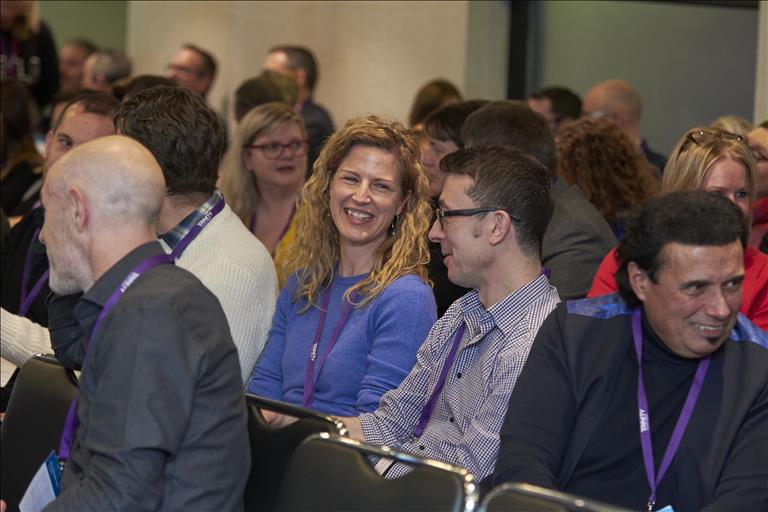ELT conference packed with practical solutions
Published Bernice on Wednesday, February 8, 2023 2:00 PM

Recruiting staff at a time of shortages, making employees feel valued on a tiny budget, and developing happy workplaces in uncertain times were some of the topical issues tackled at English UK’s 2023 ELT conference.
The conference included low-cost online sessions for English language teachers following a sell-out event in London aimed at academic managers.
Hayley Maxwell from the University of Birmingham, a regular attendee at the academic management day, said the event “was very relevant. I felt it had the finger on the pulse of what mattered.” First-timer Jenni Fogg of Summer Boarding Courses said: “It’s been really helpful. All the stuff about recruitment is part of my job and it’s been more difficult since the pandemic. The advice will be really helpful this summer.”
Closing the event, English UK’s director of marketing communications Annie Wright said: “It’s been a really practical day with so many things to take home for us for our staff and the sector as a whole. I hope we are all feeling more hopeful at the end of it.”
The conference began with a panel session on the capacity challenges. Val Hennessy from IH Bristol said that in 2022 they found “there were just fewer people in the system” and not enough homestay providers to take additional bookings they could have made. “Centres like ours where we train teachers – if we get a good one, we give them a job instantly and they never go into the marketplace.”
There was a “nightmare spiral” whereby lower numbers of teachers qualified to train others was making it harder to train enough teachers. Initiatives included having job adverts for named posts permanently running, and employing good people even if there wasn’t a current gap. “It’s counter to how many [English language] schools work. Staff benefits have to go up, which can mean more flexibility or offering something you haven’t thought of yet and the only way to think of that is to talk to the teachers working for you now,” said Val. It was important to look at the whole package not just the salary and for teachers – and other staff – coming to Bristol for summer work it was a non-starter without including accommodation. “We have to rethink how we recruit staff,” she said.
Helen Lunney of Celtic English Academy said they paid well, created additional roles which supported the school’s aims, and match people to those in appraisals. “They really appreciated that – the buzz in staff rooms and meetings is so much more positive,” she said. There was a robust INSET programme and staff were encouraged and funded to seek external training. At interview, teachers were told the school was willing to fund them through the DELTA and some had said that was why they had taken the job. Other plus points for staff were a huge teachers’ room, permanent contracts, good tech in every classroom, social activities and team-building events.
In a later session, Shirley Norton of The London School of English focused on the importance of working conditions in staff recruitment and retainment post-pandemic. She said that while the pandemic itself had fostered a sense of camaraderie among staff, that had been followed by stress, burnout and new problems including a lack of teachers. Something different had to happen. Her ideas were all things which could be done on no or very low budgets.
Things which could be done without a budget included focusing on the welfare of all staff, managers included, and 1-2-1 welfare conversations as a standard. What could be removed from standard processes? Could working hours reduce? Where could there be flexibility? It was important to protect and respect break times, and bring together different teams during working hours and also for the company to be open about plans and vision. What could the company do which cost nothing except some admin time?
Steve Tulk of English Path argued that successful schools were those where the academic and marketing teams were working together. Three ways in which academic managers could support business were to meet marketing colleagues and talk about the pipeline- and make sure the meeting happened, understand the sales pipeline and be part of the development process, and have a can-do culture.
Plenary speaker Afshan Baksh, talking about managing change, said it was about “leading with heart and in an inclusive way. Where we don’t have money are we falling back on feelings and how we make people feel happy and valued, and is there a way of bringing that into the organisation.”
Other sessions during the academic management day focused on how English UK members have added new products to their organisation, using Lego for teambuilding, supporting neurodiversity, managing allegations of abuse, British Council inspections, multimodal literacy and several discussion sessions.
Jacopo Castaldi of Canterbury Christ Church University explored teaching ELT in a multimodal context where, he said, people using English and communicating using multimodal literacy could have an advantage in the global job market. “It is a more realistic context for language use,” he said.
The teacher-focused days had eight online sessions on subjects including exam preparation, engaging Gen Z, supporting young neurodivergent students and post teaching practice feedback. Another session from Chris Roland discussed ways of removing the tension from teenage classrooms where usual teaching techniques can add to the strain for young learners.
Previous Article Promote Your School Next Article



